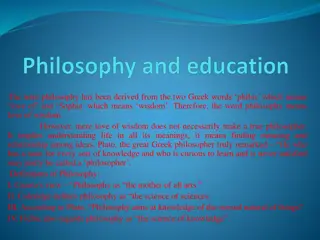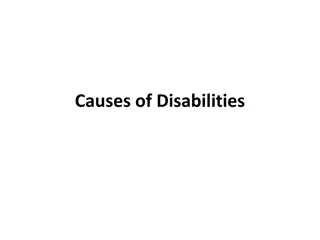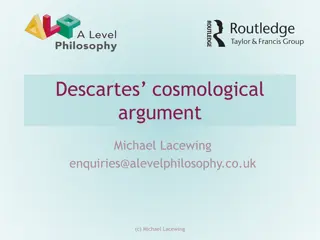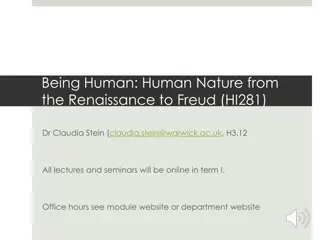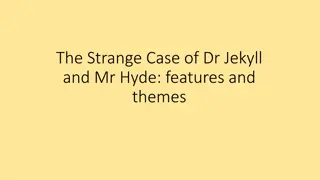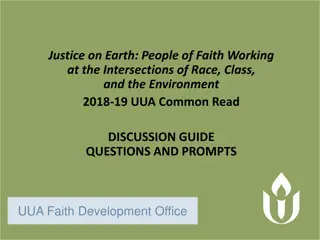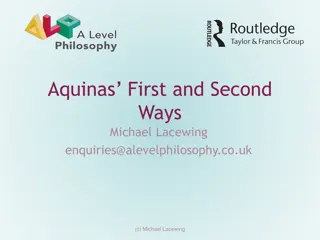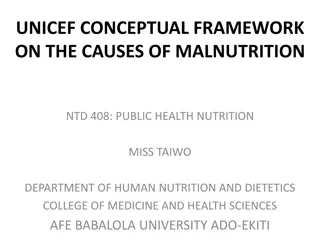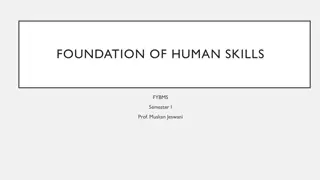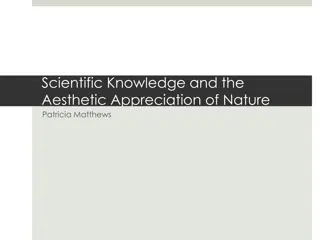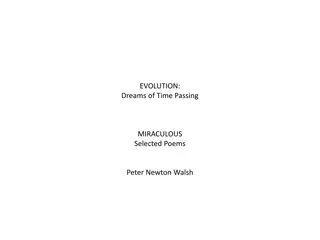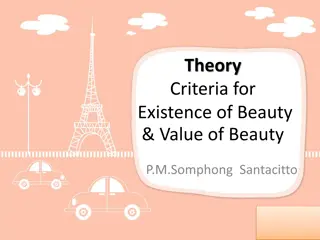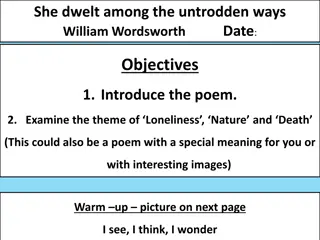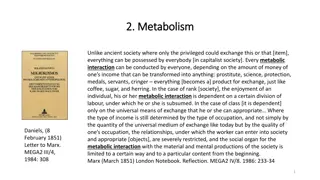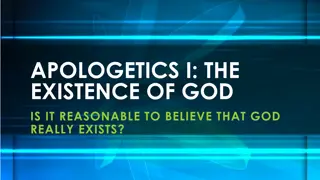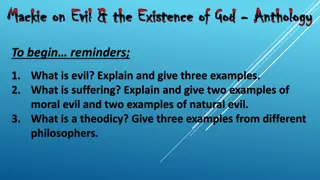Exploring the Existence of Causes in Nature and Human Understanding
The discussion delves into whether everything has a cause and if humans can comprehend all causes. It contrasts functional and formal approaches, questioning the universal expectation that phenomena have causes and if humans can identify them all. Various linguistic theories are referenced, emphasizing the pursuit of explanation over mere description in scientific inquiry.
- Causes in Nature
- Scientific Inquiry
- Linguistic Theories
- Functionalism vs. Formalism
- Human Understanding
Download Presentation

Please find below an Image/Link to download the presentation.
The content on the website is provided AS IS for your information and personal use only. It may not be sold, licensed, or shared on other websites without obtaining consent from the author. Download presentation by click this link. If you encounter any issues during the download, it is possible that the publisher has removed the file from their server.
E N D
Presentation Transcript
Is there a cause for everything, and is man able to understand all causes? Tobias Scheer Universit C te d'Azur, CNRS 7320 51st Pozna Linguistic Meeting Pozna , 8-10 September 2022
Donegan, Patricia & David Stampe 1979. The study of natural phonology. Current approaches to phonological theory, edited by Daniel Dinnsen, 126-173. Bloomington: Indiana University Press. purpose Natural Phonology (Morphology) holds that things in language are natural and have causes (Donegan & Stampe 1979: 126f) therefore Chomskyan Universal Grammar (UG) is misled UG is a descriptive list of properties in case it can be identified, it is uninformative the goal of linguistic, and more generally scientific inquiry, is explanation, rather than description. the generative ambition is descriptive in kind: find out about the properties of UG. the day we know, we will still have no answer to the question why UG has the properties it does, rather than any others.
Donegan, Patricia & David Stampe 1979. The study of natural phonology. Current approaches to phonological theory, edited by Daniel Dinnsen, 126-173. Bloomington: Indiana University Press. purpose Natural Phonology "is intended to explain its subject matter, to show that it follows naturally from the nature of things; [ ] it is not intended to describe its subject matter exhaustively and exclusively, i.e., to generate the set of phonologically possible languages." Donegan & Stampe (1979: 127, emphasis in original)
purpose question addressed in this talk is it the case that scientific inquiry (in the adult sciences) #1 expects that all phenomena in the universe have a cause? #2 if so, that man is able to identify all causes?
Functional vs. formal approaches: does everything in nature have a cause?
does everything have a cause? Newmeyer, Frederick 1998. Language Form and Language Function. Cambridge, Mass.: MIT Press. question #1: existence of a cause does everything in nature have a cause? functionalists: yes formalists: maybe functionalism vs. formalism
does everything have a cause? example: negation is never expressed by word order (no language known) functionalists: there is a reason for that. the typological absence of this pattern is an accidental gap: nothing prevents a language to have it. the reason why it is absent form the record are other grammatical or extra- grammatical factors that make the pattern dysfunctional, hence dispreferred. extra-grammatical factors bearing on language include: intentions of the speaker, phonetic difficulty, social and cultural demands, register, style, communicative needs.
does everything have a cause? Dressler, Wolfgang 1984. Explaining Natural Phonology. Phonology Yearbook 1: 29-51. Dziubalska-Ko aczyk, Katarzyna 2001. Phonotactic constraints are preferences. Constraints and Preferences, edited by Katarzyna Dziubalska-Ko aczyk, 69-100. Berlin, New York: Mouton de Gruyter. thus there is always a remote island where word order-expressed negation actually occurs: this is when the counter-acting factors are overridden. Not really probable, but possible. "[a] model of NP claims fewer absolute than relative extraphonological constraints on phonology; these do not exclude phenomena, but rather render them costly so that they occur infrequently" (Dressler 1984: 31) "absolute predictions with reference to language behaviour (if not in general) are impossible." Dziubalska-Ko aczyk (2001: 69f.)
does everything have a cause? formalists: the absence of word order-expressed negation is a systematic gap. there is no remote island that could exist where this pattern is found. because it is disqualified by UG there is no point is asking why because the properties of UG are arbitrary and make no sense.
Haspelmath, Martin 2008. Parametric versus functional explanations of syntactic universals. The limits of syntactic variation, edited by Theresa Biberauer, 75- 10. Amsterdam: Benjamins. Scheer, Tobias 2019. The remote island, unattested patterns and initial clusters. Approaches to the Study of Sound Structure and Speech. Interdisciplinary Work in Honour of Katarzyna Dziubalska-Ko aczyk edited by M. Wrembel, A. Kie kiewicz-Janowiak & P. G siorowski, 129-144. Oxford: Routledge. does everything have a cause? functionalism and formalism share more than what the controversy may suggest agreement #1: there are innate (i.e. genetically coded), universal and specifically linguistic (i.e. domain-specific) properties of language. agreement #2: there are extra-grammatical factors that bear on language, some of which are cognitive in kind (domain-general). agreement #3: some gaps in the empirical record stem from extra-grammatical factors and are accidental: there is a remote island for these patterns, but it is improbable that this island will ever be found.
Haspelmath, Martin 2008. Parametric versus functional explanations of syntactic universals. The limits of syntactic variation, edited by Theresa Biberauer, 75- 10. Amsterdam: Benjamins. Scheer, Tobias 2019. The remote island, unattested patterns and initial clusters. Approaches to the Study of Sound Structure and Speech. Interdisciplinary Work in Honour of Katarzyna Dziubalska-Ko aczyk edited by M. Wrembel, A. Kie kiewicz-Janowiak & P. G siorowski, 129-144. Oxford: Routledge. does everything have a cause? disagreement: functionalists: there is always a remote island formalists: in some cases there is no remote island the disputed issue is whether genetically coded properties of language, domain-specific or domain-general, may be counteracted by other factors. Chomskyan analysts say no (hence the gaps produced by these properties are systematic), functional analyses say yes (the gaps at hand are accidental, like all others). for the former group there is no remote island for gaps created by genetically coded properties of language, while for the latter there is.
does everything have a cause? central issue in the functionalism - formalism debate: if it can be shown that language is constrained by arbitrary (= non-natural) properties that do not make any sense, functionalism has a problem. in this case, there are still functional explanations but some properties of language are not functional in kind. terms of the debate everybody agrees that some properties of language have a functional explanation. the question is whether there are also properties that don't. ==> typical empiricist / monist vs. rational / dualist opposition
does everything have a cause? Cinque, Guglielmo 2013. Cognition, universal grammar, and typological generalizations. Lingua 130: 50-65. Golston, Chris 2018. Phi- features in animal cognition. Biolinguistics 12: 55-98. candidate for arbitrary properties that don't have a remote island: grammaticalization real world properties that are commonly grammaticalized person, number, gender, tense, aspect, diminutive, negation, etc. less commonly grammaticalized animacy, human, alienability rarely grammaticalized mirative: surprise (Hare, Athabascan) frustrative: action unsuccessful (Arawaki Nanti, Amazon) never grammaticalized (in the known record) being afraid of doing something shamelessness danger etc.
does everything have a cause? Golston, Chris 2018. Phi- features in animal cognition. Biolinguistics 12: 55-98. what's the rationale behind things that can and cannot enter grammar? certainly not "importance for the individual or the species" "If grammatical categories marked what was important to people, we might expect genders based on profession, age, and hair color. But such categories are lacking in grammars of all languages." Golston (2018: 83) "More surprising is that partner preference is not marked grammatically in any language. Grammar never marks who you prefer to have sex with, or even whether you have sex, just whether you are biologically male or female. This despite the clear importance of sexual preference to most people. [ ] In any case, the rich notions of sex that humans deal with are ignored by grammar, which treats sex as a simple binary opposition." Golston (2018: 84f)
the unknowable philosophy of mind textbooks such as Braddon-Mitchell, David & Frank Jackson 1996. Philosophy of mind and cognition. Second edition 2007, Oxford: Blackwell. Pp.8-10. recall question #1: existence of a cause does everything in nature have a cause? functionalists: yes formalists: maybe question #2, what "maybe" means: the unknowable is man able to understand all patterns in nature? functionalists: yes (?) formalists: yes (some), no (others) those formalists who say no hold that there may be causes for the properties of UG but we don't understand them and never will (no matter what technological and scientific advance will be made) there are things unknowable to man, because man is limited in design.
the unknowable debate among formalists the unknowbale exists: Descartes, Chomsky, Fodor the unknowable does not exist: Pinker, Plotkin, Sperber
the unknowable Descartes, Kant, Fodor (dualist position) Descartes: Kant: Fodor, within the mind: body vs. mind thing vs. thing in itself modules vs. central systems (lower cognitive functions) (higher cognitive functions) ideas shared: dualist position: there are two things one of them (the rightmost item in the above dichotomies) lies beyond what can be understood by human intelligence and will always remain an impenetrable mystery. only the leftmost item is open to reason and rationalist inquiry (this is why Fodor calls Rationalist Psychology)
the unknowable Pinker, Steven 1997. How the mind works. New York: Norton. Plotkin, Henry 1998. Evolution in mind. Cambridge, Mass.: Harvard University Press. Sperber, Dan 1994. The modularity of thought and the epidemiology of representations. Mapping the mind: Domain specificity in cognition and culture, edited by L.A. Hirschfeld & S.A. Gelman, 39-67. Cambridge: CUP. Sperber, Dan 2001. In Defense of Massive Modularity. Language, Brain and Cognitive Development, edited by Emmanuel Dupoux, 47-57. Cambridge, Mass.: MIT Press. Smith, Neil 2002. Modules, modals, maths and the mind. Glot International 6.8: 248-250. Massive Modularity extending modular workings to central systems: Pinker (1997), Plotkin (1998), Sperber (1994, 2001) Evolutionary Psychology tenets Fodor s central systems are also modules. they are just harder to understand. strict separation between modules and non-modular central systems called into question: Smith (2002, 2003)
the unknowable Chomsky, Noam 1984. Modular Approaches to the Study of Mind. San Diego: San Diego University Press. Chomsky, Noam 1995. Language and Nature. Mind 104: 1-61. Chomsky on the unknowable If you look at physics, or the history of ideas, or the theory of evolution or whatever, it seems to me that no reason has been advanced to lead us to suppose that we can find answers to the questions we can pose except in certain very narrow domains. It could turn out that questions of this sort lie beyond the bounds of the specific biological system which is human intelligence Chomsky (1984: 6f) As for the matter of cognitive reach, if humans are part of the natural world, not supernatural beings, then human intelligence has its scope and limits, determined by initial design. We can thus anticipate that certain questions will not fall within their cognitive reach, just as rats are unable to run mazes with numerical properties, lacking the appropriate concepts. Such questions we might call "mysteries-for-humans", just as some questions pose mysteries-for-rats. Among these mysteries may be questions we raise, and others we do not know how to formulate properly or at all (Chomsky 1995b: 2)
the unknowable history of science: the unknowable has bad press because it creates a place for God, brought back in through the back door. people who believe there is such a thing are traitors to enlightenment examples materialists of the 18thcentury (D. Hume) charged Descartes of being a speculative philosopher because in his mind-body dichotomy the mind (= soul) is unknowable. Newton was charged for calling on something we cannot see and have no means to detect, gravity. Kant and his dichotomy thing vs. thing-in-itself: the latter in unknowable. Big Bang theory (G. Lema tre, 1927) makes space and time finite: there was a time before the birth of the Universe, and there is a location that lies outside the universe. Big Bang was charged with creating a place for God: beyond accessible time and space.
The unknowable in adult science is undisputed
adult science the unknowable in adult science physical (or natural) constants speed of light c gravitational constant G Planck constant h elementary charge e mathematical constant 299 E6 6,67430 E-11 m3 kg-1 s-2 6,626 E-34 1,602 E-19 3,14159 meters / second J s C these constants are irreducible make no sense = their value cannot be derived from anything else = nobody knows why they have their respective value, rather than any other
adult science making sense of natural constants that make no sense secular version multiverse there are parallel universes, which have different properties, among which different values for natural constants. our own universe with its motion of planets etc. is only possible if the natural constants are the ones we know. quantum mechanics events are taking place in different universes. Different unpredictable events (particles "choosing" a particular hole to go through) are unpredictable because they occur in different universes. transcendental version intelligent design the subtle interplay of all these natural constants which allow the Universe to exist cannot be accidental: there must be a superior being who has arranged them in the way they are.
adult science the unknowable in adult science in the sense of Donegan & Stampe (1979), natural constants are a descriptive list of properties but not the goal of scientific inquiry, which is about causes what science is about sure, find out about causes but in adult science, all that can be done regarding some issues is to discover and describe the properties of universal items, and be dead sure that they do not follow from anything or at least from anything man can discover: natural constants have no cause accessible to man.
adult science the unknowable in adult science UG has the same status as natural constants it describes the properties of a universal thing (the language faculty) which do not follow from anything and thus have no cause accessible to man note that this point is entirely independent of the question whether or not there are in fact remote islands for all the seemingly arbitrary properties of UG. it merely says that UG in linguistics is the result of the same practice that prevails in regular adult science.



